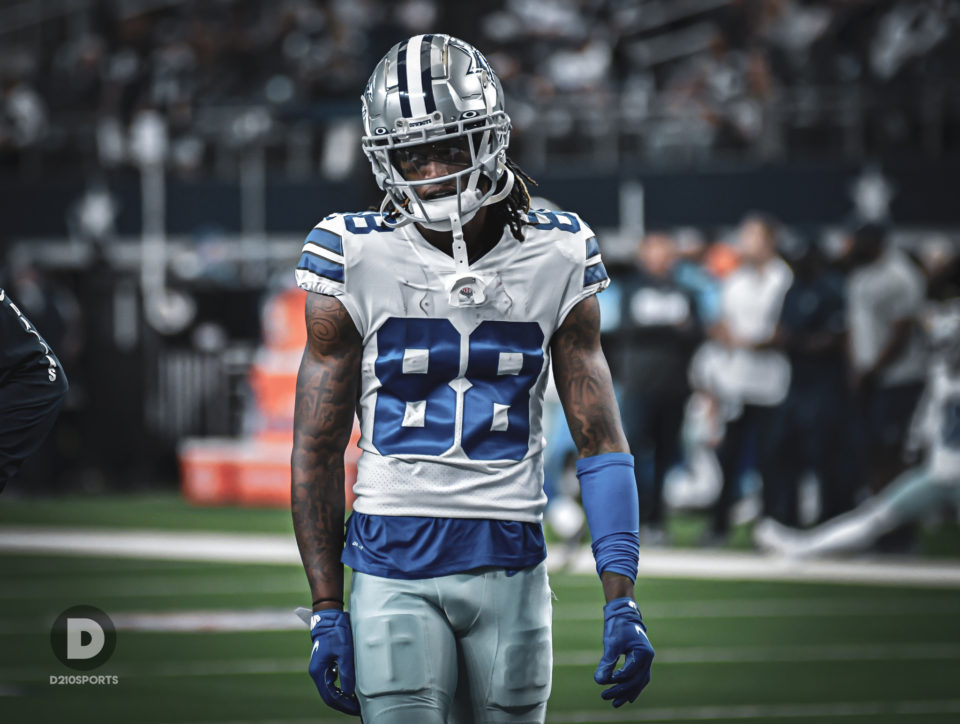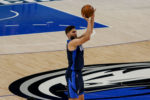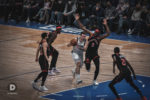FRISCO, Texas – Another one and done season for the Dallas Cowboys is in the rearview begging the question, what went wrong? At the conclusion of the 2021 season, reflection ensues. Once again, the Cowboys squandered the chance of hoisting the Lombardi Trophy following a 23-17 loss to the San Francisco 49ers in the wild-card round.
Dallas had the talent but fell short, concluding a roller coaster year of highs and lows. A plethora of issues plagued the Cowboys throughout the duration of the season, but the glaring hindrance rests on the offense. On the stat sheet, Dallas graded as the No. 1 scoring offense and No. 1 in total offense due to the unit’s success during the 6-1 start, but the façade masked an unpleasant reality. Let’s unpack it, shall we?
Play-Calling
Sure, as the quarterback of America’s Team, the blame will rest on Dak Prescott’s shoulders, but Kellen Moore/the coaching staff did him no favors on Sunday afternoon. Without a doubt, he had some missed throws and poor decisions, but Prescott was not put in the best position to have success. More details will be elaborated on further down, but in summarization, 49ers’ defensive coordinator DeMeco Ryans was able to generate effective pressure with a four-man rush, allocating more resources to the back end. However, this was not a new concept. Prescott operates best in a balanced, play-action centric offensive attack but with a broken run game, he was forced to turn into a 35-plus pocket passer. Not ideal. Teams did not fear Dallas’ offensive line or ground game, knowing they could smash up front with less firepower and have more guys in the secondary to cover pass catchers. This led to receivers’ inability to get open and Prescott looking frazzled, hesitant, and holding onto the ball too long as the first few reads were “no.” There is a reason Dallas rarely sees man coverage or heavy-blitz packages anymore – it is because they mastered it. See Amari Cooper’s touchdown vs. the 49ers for reference.
Instead of helping Prescott by dialing up Cover 2 beaters throughout the season or moving CeeDee Lamb or Tony Pollard inside in the slot to affect coverages on underneath/crossing routes, Lamb was left on the outside and Pollard received a limited snap count. Against the 49ers, Lamb saw three snaps in the slot and Pollard was mainly used as a kick returner, with just six touches. Sigh. The Niners’ were using zones and split safeties to smother Cooper and Lamb on the outside, which left the middle exposed. Additionally, the 49ers used Cover 4 (four deep, 3 underneath zones), which Dallas should have been able to exploit with underneath routes in a quick passing game. Both Lamb and Pollard possess outstanding yards-after-catch ability and elusiveness in space. So why was the most explosive back limited to minimal snaps? Or for that matter, why did they not utilize Lamb on a comeback route or a curl? To make matters worse, where was 21 personnel (two running backs, one tight end)? The Cowboys did not use the grouping once, having both Pollard and Elliott on the field together. It is no secret that the Cowboys do not have stellar blocking tight ends and are more of a hindrance on chips than anything, why not bring in two running backs to assist up front and max protect as Prescott endured constant pressure? Frustrating to say the least. Play after play, the result was the same.
Time will tell if Kellen Moore called his last game in Dallas as interviews pile up. Regardless, the way the Cowboys’ offense sputtered in the latter half of the season with an embarrassment of riches on the roster is simply impermissible. The decline spearheaded the team’s collapse in another disappointing outcome.
The Regression Of The Offensive Line
The once esteemed Dallas offensive line is no more. The unit that was deemed the best in the NFL a few years ago became a liability in 2021. The fear element that opposing defensive linemen previously had in battling against the Cowboys ‘Great Wall’ is now gone. 49ers’ defensive end Nick Bosa vocalized that thought ahead of the wild-card matchup, candidly stating both Tyron Smith and La’el Collins are “beatable,” with plenty of evidence on tape.
The Cowboys’ offensive line consistently got beat at the point of attack by the 49ers defensive front, and for the better part of the season. Prescott was harassed in the pocket, sacked five times and hit an additional 14 times. For context, the 49ers only blitzed the Cowboys 18 percent on Sunday, but achieved pressure on 50 percent of Prescott’s drop backs per PFF metrics. The more discouraging note, without Bosa for the majority of the second half – the Niners’ best pass rusher – they were able to log 50 percent pressure! That is an utter embarrassment. San Francisco was able to destroy Dallas’ protection with only four guys at the line of scrimmage, allowing seven to cover the Cowboys’ receiving threats. That forced Prescott into frustrating checkdowns with no receivers open on a multitude of plays.
Injury-prone Tyron Smith again missed several games, adding to his compilation of six consecutive seasons without playing the full year. Even when he came back, the left side of the Cowboys’ offensive line got punished. Connor Williams re-established himself as the starting left guard after being benched by the coaching staff for racking up an exorbitant number of holding penalties. Mike McCarthy felt he was being targeted by officials and he was sidelined. Connor McGovern was then placed at left guard in his absence, which turned out to be catastrophic.
Williams will soon become a free agent and after a struggling campaign, the Cowboys will look to upgrade the position. In addition, Dallas needs to find a successor for an aging, Smith. Center Tyler Biadasz took a step back down the stretch of the season with several botched snaps, making one thing clear: the Cowboys must bolster the interior. Plus, add a more consistent swing tackle to the mix in free agency to add competition alongside Terence Steele. The sole fact that the Cowboys chose to rotate Steele and Ty Nsekhe at left tackle between several series (during Smith’s absence) serves as evidence. The staff felt Nsekhe was the better pass protector, adding to the carousel of lineup shuffles and lack of continuity sparking confusion.
A Non-Existent Rushing Attack
For the better part of the 2021 season following Week 6, the Cowboys have had an abysmal run game. In analyzing runs throughout the duration of the season, a lot of the issues stemmed from the offensive line’s inability to win matchups at the line of scrimmage, not producing open rush lanes. To tack onto that, predictability: Consistently trying to run the ball through the tackles for no gain or bringing in additional linemen to assist in run blocking, which only tipped the opposing defense off. Instead of forcing players to try and make a play on the field, provide adequate solutions. That did not happen.
Elliott confirmed he partially tore his PCL earlier in the season that led to a visible dip in production. The injury could not get worse by him playing but as a result, why did Pollard not receive more carries? Pollard’s slash running style and shiftiness in space elevate the offense and each play, he is a chance away from breaking a long, momentum-shifting run. Just look at his kickoff returns. The discouraging note? All season long when the staff was asked about taking more shots at the edges, they responded perimeter runs are in the “secondary, auxiliary” category. Inexcusable. Yes, the offensive line had struggled, and Dalton Schultz is not a great blocker, but throw in receivers on stalk blocks and use a counter pull to get linemen out in front to clear traffic. Or like Kyle Shanahan does with Elijah Mitchell and Deebo Samuel, use him and Lamb on jet sweeps and bubble screens to kickstart the ground game. Against the 49ers, like much of the season, Dallas could not get the ground game rolling. The team amassed 77 yards rushing on 21 carries, for a 3.7 average per carry. To make matters worse, Prescott’s 17-yard run off a quarterback draw with :14 seconds on the clock was their longest run. Translation: the other 20 carries netted a porous 60 yards.
An inability to run the ball, put the Cowboys in third-and-long situations, allowing the opposition to unleash pass rushers. The simple fact that Dallas could not get something going on the ground against light boxes is demoralizing.
Penalties
Dallas was penalized a total of 141 times and lost a combined 1,192 yards because of flags through 18 (including wild-card) games – not the way to win football games. The Cowboys led the league in penalties at home (78) and away (68). Holding penalties — amidst a myriad of other transgressions — killed drives and gave momentum to the opponent.
Against the 49ers on the second series of the ballgame, a holding penalty on Connor Williams negated a 32-yard gain to CeeDee Lamb. Prescott rolled out and connected with Lamb over the middle of the field against zone coverage. However, the play was taken back, and Cedrick Wilson tossed a would-be lateral to Tony Pollard out of bounds.
Then in the third quarter, the trend continued. Needing to add to their point total, the Cowboys fell short. Dallas was flagged for back-to-back false start calls and on the ensuing play, Prescott was sacked on third-and-long. On the punt, even with a gifted roughing the kicker penalty that produced 15 yards and a fresh set of downs, Dallas could not cash in or make it past their own 45-yard line. Negative plays put the Cowboys in unfavorable down and distance situations that produced slow starts. Mike McCarthy emphasized in his season-ending press conference that the No.1 priority moving forward is addressing penalties, specifically pre-snap. Self-inflicted wounds have crippled the Cowboys and are an indicative factor in the team’s abrupt January end.
Dallas had the tools to make a deep postseason run but the offensive line, negative plays, unimaginative play-calling, inconsistent passing game and nonexistent running game had a hand in the team’s downfall.




